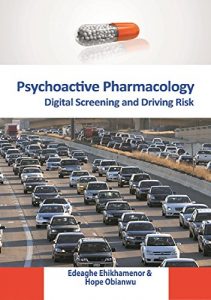Synopsis:
This incisive book offers an epidemiological study of road users’ consumption of psychoactive substances in Nigeria. It examines psychoactive drug screening and the use of driving simulators to evaluate skills impairment after drinking alcoholic beverages.
Portable electronic digital screening devices such as “Oral Screen,” along with other screening devices were used to establish the prevalence of substances of abuse among road users in some selected cities in Nigeria.
Blood, saliva, urine, and other biological fluids were screened. Skills impairment, characterized by unsafe driving actions based on the level of blood alcohol concentration (BAC), was evaluated using a driving simulator. The findings were validated by application of a Field Impairment Test (FIT) or modified clinical test of impairment.
The implication of the results on everyday highway utilization and the best approach for research into screening for psychoactive drugs are highlighted, along with several recommendations to enhance highway safety.
About the Author:
Edeaghe Ehikhamenor is a senior lecturer at the University of Benin, Benin City, Nigeria, and the founder/national coordinator of Save Accident Victims Association of Nigeria (SAVAN) (www.savan.org). He has a bachelor of dental surgery, (BDS) a master’s in pharmacology, and a Ph.D. in pharmacology and toxicology from the University of Benin. He has extensive research experience on digital screening of alcohol and other psychoactive drugs with saliva and biological fluids to establish skills impairment on a driving simulator.
Hope Obianwu is a professor of pharmacology and toxicology who has served as past dean of pharmacy at the University of Benin and the department head at Niger Delta University in Nigeria. He is on the editorial board of several national and international journals, and has mentored several Ph.D. and master’s graduates in pharmacology.
Publisher’s website:http://sbprabooks.com/EdeagheEhikhamenorandHopeObianwu
This incisive book offers an epidemiological study of road users’ consumption of psychoactive substances in Nigeria. It examines psychoactive drug screening and the use of driving simulators to evaluate skills impairment after drinking alcoholic beverages.
Portable electronic digital screening devices such as “Oral Screen,” along with other screening devices were used to establish the prevalence of substances of abuse among road users in some selected cities in Nigeria.
Blood, saliva, urine, and other biological fluids were screened. Skills impairment, characterized by unsafe driving actions based on the level of blood alcohol concentration (BAC), was evaluated using a driving simulator. The findings were validated by application of a Field Impairment Test (FIT) or modified clinical test of impairment.
The implication of the results on everyday highway utilization and the best approach for research into screening for psychoactive drugs are highlighted, along with several recommendations to enhance highway safety.
About the Author:
Edeaghe Ehikhamenor is a senior lecturer at the University of Benin, Benin City, Nigeria, and the founder/national coordinator of Save Accident Victims Association of Nigeria (SAVAN) (www.savan.org). He has a bachelor of dental surgery, (BDS) a master’s in pharmacology, and a Ph.D. in pharmacology and toxicology from the University of Benin. He has extensive research experience on digital screening of alcohol and other psychoactive drugs with saliva and biological fluids to establish skills impairment on a driving simulator.
Hope Obianwu is a professor of pharmacology and toxicology who has served as past dean of pharmacy at the University of Benin and the department head at Niger Delta University in Nigeria. He is on the editorial board of several national and international journals, and has mentored several Ph.D. and master’s graduates in pharmacology.
Publisher’s website:http://sbprabooks.com/EdeagheEhikhamenorandHopeObianwu






